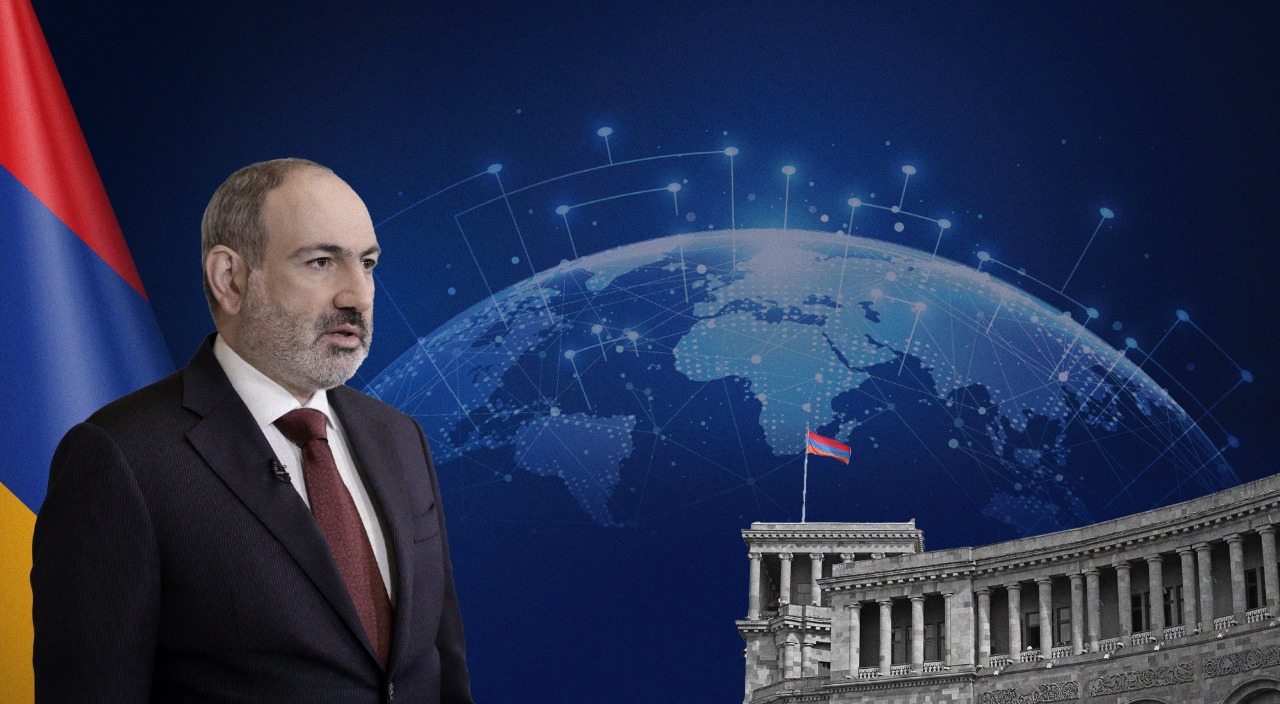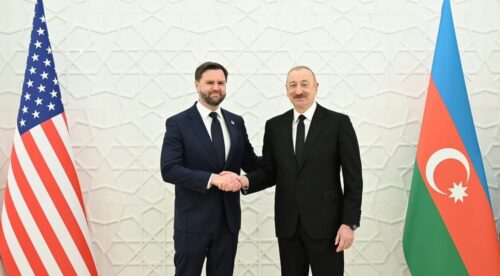
TRENDS: The changing South Caucasus: Where is Armenia going and what geopolitical interests do regional actors pursue?
A series of foreign policy steps taken by Armenia in the past two years indicates a long-term deviation in the country’s traditional geopolitical posture—moving away from reliance on Russia and toward an alignment with the West. While growing ties with the United States (U.S.) and the European Union (EU) are often described as resolutely anti-Russian moves aimed at pushing Armenia to escape the Russian sphere of influence, Yerevan is in fact trying to build a diversified, multi-vector foreign policy, TRENDS Research & Advisory research center writes.
As noted, the signing of a strategic partnership agreement with the United States on Jan. 15, 2024 marked a new stage in bilateral relations. The document includes a number of stipulations, though the most interesting is Washington’s support to boost Armenia’s border security and its military capacity. As to the EU, the latter has expanded its civilian monitoring mission in Armenia and initiated a visa liberalization process with Yerevan.
The research says the West has its own reasons to push for closer contact with Armenia. Firstly, it is because Yerevan now increasingly seeks to diversify its foreign policy. By building a more expansive type of relations with Yerevan, the West hopes to widen the gap between Russia and Armenia. The calculus is rooted in pure geopolitics. While Russia is preoccupied in Ukraine, the EU and the U.S. try to undermine Russian influence elsewhere. Secondly, because of the complicated relations between Georgia and the West over the failed EU integration process,[2] Tbilisi is no longer seen by Brussels and Washington as a strategic partner. In that sense, Armenia is seen as a replacement for Georgia, a new actor upon which the West wants to base its influence in the South Caucasus. Thirdly, there is also the factor of the Armenian diaspora. Though often exaggerated, the diaspora is nevertheless an important player when it comes to swaying opinion in some Western capitals. Last but not least, Armenia is increasingly seen as the only surviving democracy in the region where, as per the Western view, non-democratic governance has gained a dominant position.
As noted, Armenia’s nascent pivot comes amid growing dissatisfaction with Moscow’s security guarantees. Yerevan’s frustration with Russia’s perceived inaction, coupled with increasing Western engagement in the South Caucasus, has accelerated this foreign policy transition.
Despite these developments, Armenia remains economically and strategically tied to Russia. Russia has made clear that it views Armenia’s deepening ties with the West as a geopolitical betrayal. Moscow could use economic leverage to pressure Yerevan, particularly given Armenia’s trade dependence on the Russian market. Moreover, although Russia is currently focused on the war in Ukraine, it still holds influence over Armenia’s energy, banking, and transportation sectors. The Russia-Azerbaijan angle should be added to this. Baku and Moscow have become closer and despite occasional tensions, as evidenced by the downing of the Azerbaijani plane by Russian missiles, the two countries share similar views when it comes to Armenia. The latter is regarded as undermining security in the South Caucasus and it is quite possible that Russia could push Azerbaijan’s ambitions to pressure Armenia.
In the short term, Armenia is likely to continue balancing between Russia and the West while testing the feasibility of deeper integration with the EU, but also remaining in the Russia-led integration projects.
In the long run, the risk of Russian response remains a key concern in Yerevan. The Armenian leadership clearly understands the limits of its pivot and that membership with the EAEU is highly beneficial to the country’s economy. Moreover, there is also a clear understanding in Yerevan that Armenia’s membership within the EAEU is incompatible with the EU membership as the two multilateral institutions are mutually exclusive. So, the Armenian leadership, as are the EU officials, is ready to develop Armenia-EU relations forward as much as the legal and geopolitical constraints would allow it.
Wider regional dynamics too do not favor Armenia’s closer geopolitical ties with the West. It is not only Russia that considers Armenia’s push westward problematic. In fact, Armenia’s all neighbors, perhaps except for Georgia, are openly against the EU’s expansion to the South Caucasus. One such powerful actor is Iran. Long seen as an ally to Armenia because of the distrust between Tehran and Baku, the Islamic Republic has now shifted its calculus and considers Armenia’s pivot as potentially troublesome. Indeed, Iran, similar to Russia and Turkey, considers the South Caucasus falling within its sphere of influence and therefore sees the presence of any non-regional actor in the region as harming its core interests. This is especially so with the EU, separate European countries or the U.S. Indeed, when the EU sent an unarmed mission to Armenia’s border with Azerbaijan, Iran was not happy and even issued critical statements. Similarly, Yerevan’s decision to sign a strategic partnership with the U.S. counters the Islamic Republic’s core imperative of building a buffer zone along its borders to keep U.S. influence at bay.
There is also Turkey, which, though not as antagonistic to Armenia’s westward push, nevertheless has always watched Western influence in the South Caucasus with caution. Though deeply integrated within the Euro-Atlantic community, Turkey has its own set of interests, which often do not correlate with what the EU or the U.S. have pursued in the South Caucasus.
Azerbaijan too sees Armenia’s pivot with caution and even some degree of animosity. Baku’s own relations with the West have notably deteriorated since Baku took over Nagorno-Karabakh and the Armenian population fled the territory.
This leaves Georgia as Armenia’s only neighbor, which is largely indifferent to what Yerevan would choose in its foreign policy. Yet given Armenia’s geography—its overland link with the European Union goes through Georgia, which gained a candidate status in December 2023—what happens in Georgia’s foreign policy deeply matters to Yerevan.
More importantly, Armenia’s Western pivot highlights structural changes in Russia’s foreign policy toward Yerevan and the South Caucasus overall. Moscow’s preoccupation with its war in Ukraine has limited Russia’s ability to exert influence over its immediate neighbors or distant territories where it maintained bases.
There are also changes in how Russia approaches its relations with Georgia and Azerbaijan. A glance at Armenia-Russia relations indicates that Moscow is no longer able to be the major actor in the region.
Thus Armenia’s shift in foreign policy is more of an attempt to pursue a multi-vector foreign policy than a complete break with Russia. It also reflects a much wider development—Russia repositioning itself in the South Caucasus in an effort to maintain its posture while being militarily preoccupied elsewhere.


